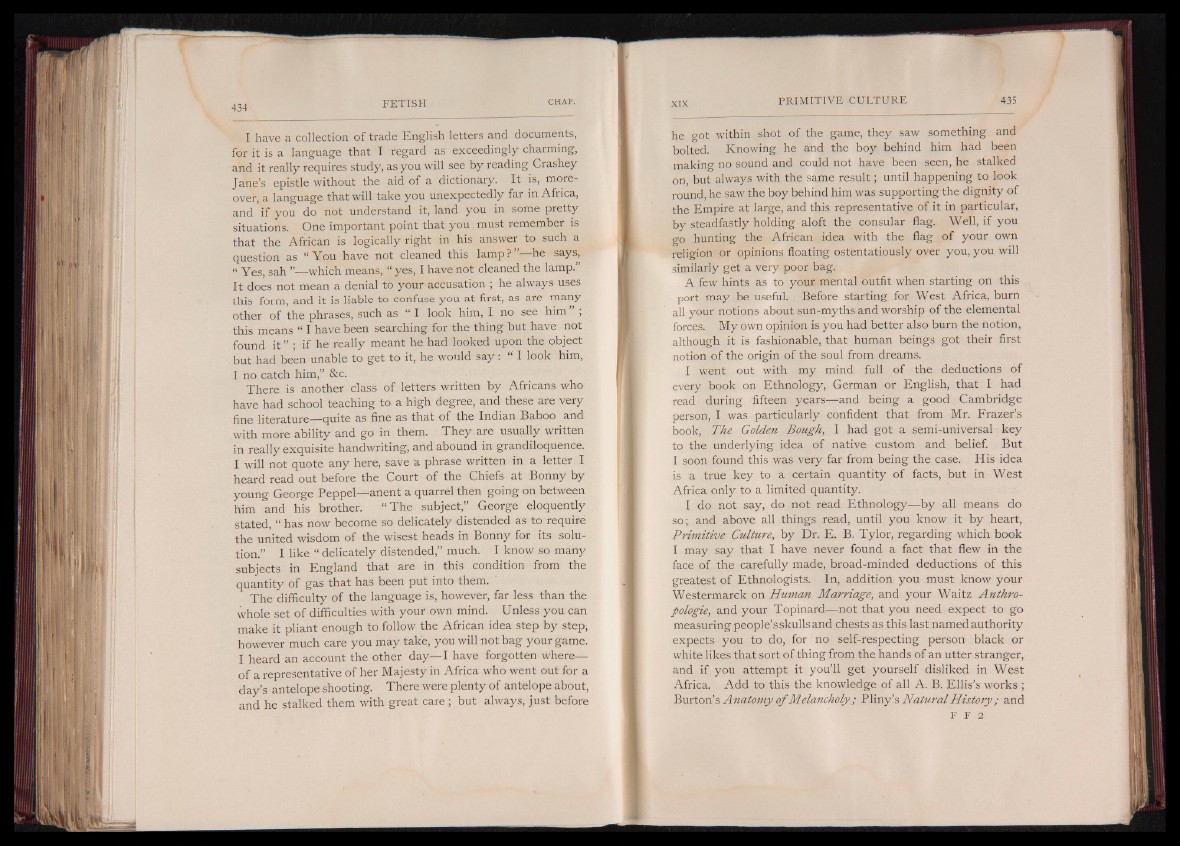
I have a collection of trade English letters and documents,
for it is a language that I regard as exceedingly charming,
and it really requires study, as you will see by reading Crashey
Jane’s epistle without the aid of a dictionary. It is, moreover,
a language that will take you unexpectedly far in Africa,
and if you do not understand it, land you in some pretty
situations. One important point that you must remember is
that the African is logically right in his answer to such a
question as “ You have not cleaned this lamp ? ” he says,
“ Yes, sah ”— which means, g yes, I have not cleaned the lamp.”
It does not mean a denial to your accusation ; he always uses
this form, and it is liable to confuse you at first, as are many
other of the phrases, such as “ I look him, I no see him ,
this means “ I have been searching for the thing but have not
found it ” ; if he really meant he had looked upon the object
but had been unable to get to it, he would say : 1 1 look him,
I no catch him,” &c.
There is another class of letters written by Africans who
have had school teaching to a high degree, and these are very
fine literature— quite as fine as that of the Indian Baboo and
with more ability and go in them. They are usually written
in really exquisite handwriting, and abound in grandiloquence.
I will not quote any here, save a phrase written in a letter I
heard read out before the Court of the Chiefs at Bonny by
young George Peppel— anent a quarrel then going on between
him and his brother. “ The subject,” George eloquently
stated, “ has now become so delicately distended as to require
the united wisdom of the wisest heads in Bonny for its solution.”
I like “ delicately distended,” much. I know so many
subjects in England that are in this condition from the
quantity of gas that has been put into them. '
The difficulty of the language is, however, far less than the
whole set of difficulties with your own mind. Unless you can
make it pliant enough to follow the African idea step by step,
however much care you may take, you will not bag your game.
I heard an account the other day— I have forgotten where—
of a representative of her Majesty in Africa who went out for a
day’s antelope shooting. There were plenty of antelope about,
and he stalked them with great care ; but always, just before
he got within shot of the game, they saw something and
bolted. Knowing he and the boy behind him had been
making no sound and could not have been seen, he stalked
on, but always with the same result; until happening to look
round, he saw the boy behind him was supporting the dignity of
the Empire at large, and this representative of it in particular,
by steadfastly holding aloft the consular flag. Well, if you
go hunting the African idea with the flag of your own
religion or opinions floating ostentatiously over you, you will
similarly get a very poor bag.
A few hints as to your mental outfit when starting on this
port may be useful. Before starting for West Africa, burn
all your notions about sun-myths and worship of the elemental
forces. My own opinion is you had better also burn the notion,
although it is fashionable, that human beings got their first
notion of the origin of the soul from dreams.
I went out with my mind full of the deductions of
every book on Ethnology, German or English, that I had
read during fifteen years—and being a good Cambridge
person, I was particularly confident that from Mr. Frazer’s
book, The Golden Bough, I had got a semi-universal key
to the underlying idea of native custom and belief. But
I soon found this was very far from being the case. His idea
is a true key to a certain quantity of facts, but in West
Africa only to a limited quantity.
I do not say, do not read Ethnology— by all means do
so; and above all things read, until you know it by heart,
Primitive Culture, by Dr. E. B. Tylor, regarding which book
I may say that I have never found a fact that flew in the
face of. the carefully made, broad-minded deductions of this
greatest of Ethnologists. In, addition you must know your
Westermarck on Human Marriage, and your Waitz Anthro-
pologie, and your Topinard— not that you need expect to go
measuring people’s skulls and chests as this last named authority
expects you to do, for no self-respecting person black or
white likes that sort of thing from the hands of an utter stranger,
and if you attempt it you’ll get yourself disliked in West
Africa. Add to this the knowledge of all A. B. Ellis’s works ;
Burton’s Anatomy o f Melancholy ; Pliny’s Natural History ; and
F F 2